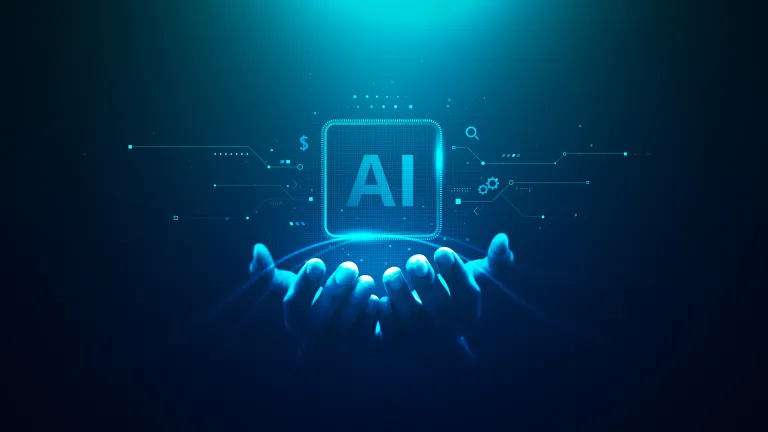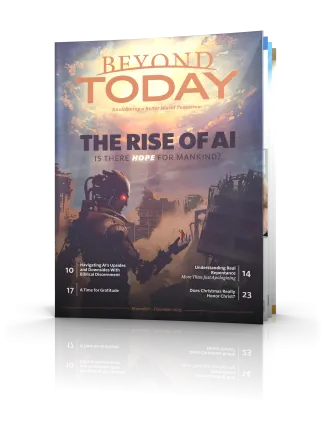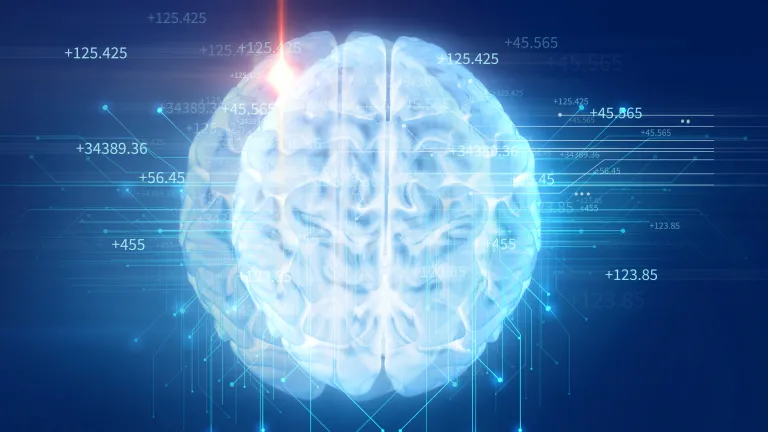The Rise of AI: Is There Hope for Mankind?

Extraordinary advances in artificial intelligence fuel dreams of ease on one hand—and nightmares of catastrophe on the other. Will artificial general intelligence supplant human decision-making and direction? Will people even survive?
Since the release of ChatGPT in late 2022, the world has been captivated by advances in the field of artificial intelligence (AI). As these systems become more humanlike in their output, everyone—from leading experts in the field to presidents and pundits alike—is feeling the accelerated pace of technology and wondering where we are headed.
In 2023, Elon Musk warned, “AI is more dangerous than, say, mismanaged aircraft design or production maintenance or bad car production . . . It has the potential of civilization destruction” (emphasis added throughout).
Is there reason to fear AI? Is it possible that AI will soon achieve human-level or even superhuman intelligence? And, if so, is there hope for mankind to survive the creation and implementation of such a powerful technology?
When machines learn to think
While the AI we see today is impressive, many experts believe we are only a few years away from artificial general intelligence (AGI)—systems with the humanlike ability to solve entirely new problems by innovation, experimentation and learning.
Since the inception of the machine age, computer software has only been able to accomplish rigid, preprogrammed instructions within strict boundaries. However, AI is now able, without a single line of new code, to perform a multitude of tasks on request. In minutes, it can make a better diagnosis than your doctor, out-argue a lawyer, translate a speech into another language, negotiate a contract and write a poem about it all in Shakespearian style.
The current reality was nearly unthinkable to the average person just three years ago when ChatGPT debuted. At the time of this writing, AI models are already able to score above average on IQ tests and ace graduate-level exams across multiple disciplines.
Despite these impressive achievements, these systems fall short of AGI.
Intelligence, much like consciousness, is difficult to actually define, and there is no widely accepted definition of exactly what constitutes AGI. Current AI systems perform well on tests because they have likely seen the information before—a distinguishing feature of AGI would be the humanlike ability to solve entirely new challenges, learning and adapting as it goes.
While today’s AI tools can already outperform most human beings on a wide variety of written and verbal tests, a true AGI system would be a world-changing breakthrough. The reason is simple: Machine intelligence can be scaled just by hooking up more processors. One could easily create entire teams of AGIs working together on complex problems from different angles just as people would—researching, experimenting, publishing findings and reasoning. They would never sleep, never take a break, and would operate at superhuman speed.
The first and most obvious task on the agenda, in the minds of many, would be to set this AGI to work unlocking the secrets of building even higher intelligence—redesigning and improving itself until it has completely surpassed human beings, a level known as artificial superintelligence (ASI).
Much thought has gone into the consequences of AGI or ASI becoming a reality, and the imagined outcomes fall into four different possible endings to the story:
1. The A.I. utopia. Guided by careful design and moral wisdom, AGI works tirelessly to end disease, to design and build clean energy grids, and to free humanity to pursue creativity. Work becomes optional, poverty fades and everyone lives happily ever after.
2. The hostile machine. Like the plot of numerous action movies, a rogue AI decides it would be better off without mankind and moves to destroy us.
3. The paperclip maximizer problem. Philosopher Nick Bostrom warned in 2004 that even a neutral AGI can be lethal if it’s simply given the wrong goal. In this scenario, the AGI is set over a factory and told to make as many paperclips as possible. It soon begins converting forests, oceans and eventually human beings into raw materials for more paperclips—inadvertently destroying mankind in a blind pursuit of a poorly defined goal!
4. Human mischief—supercharged. The most likely and earliest danger is abuse of this rapidly changing technology for evil. Just as mid-20th-century physics gave way to nuclear bombs with terrible destructive power, nations or criminals could weaponize and unleash AGI for cyberwarfare, bioweapons and more.
Notice that only one of these outcomes doesn’t end with the destruction of mankind! But will the technologies really advance to such extremes?
2025: The year of AI agents
By the end of 2024, tech leaders were already calling 2025 “the year of AI agents,” signaling a fundamental change in how AI would be used.
Until recently, AI tools like ChatGPT could only generate text and ideas—they could not take real-world action outside of giving a response to a user’s input. AI agents change that completely.
The key difference between a chatbot and an AI agent is that an agent can interface with other software tools, even without being explicitly told to do so, to accomplish a task on its own. The earliest step toward AI agents was adding simple web-search features, allowing AI to perform its own Internet searches, scanning through dozens of different websites to answer detailed queries with up-to-date information.
Significantly, on July 17, 2025, Open-AI released Agent Mode in ChatGPT, imbued with the ability to fully use the Internet through a web browser. For example, you can give Agent Mode the dates of an upcoming trip, your budget and some interests, and it can research the area, plan a full, day-by-day itinerary and book your hotel and tickets for you!
The massive financial bet on AI
If investment is a measure of expectation, the world’s richest companies and governments all clearly believe that AGI—or something similarly world-changing—is coming soon.
In January 2025, OpenAI announced construction of Project Stargate, a $500 billion datacenter requiring over five gigawatts of power—more than twice the output of Hoover Dam. Meanwhile, Elon Musk’s supercomputing center, dubbed Colossus, has cost $4 billion so far and draws 150 megawatts from the grid, with plans to spend $25 billion to quadruple its capacity to nearly 1 gigawatt.
And the spending doesn’t stop at hardware. In one of the most aggressive talent recruiting wars in history, Meta (formerly known as Facebook) has offered elite AI researchers compensation packages worth $300 million per person over four years—sometimes more than $100 million in the first year!
In all this, key chipmaker Nvidia skyrocketed to become the world’s most valuable company in history, topping $4.5 trillion in value.
This “compute race” resembles the nuclear arms buildup of the Cold War, but with one striking difference—the pace. Nuclear weapons development spanned decades; ChatGPT was released just three years ago.
Russian President Vladimir Putin famously said in 2017, “Whoever becomes the leader in AI will become the ruler of the world.” That prediction accurately summed up the fervor for powerful AI systems that has ignited these historic investments.
Biblical perspective: Is AGI really possible?
The fact is, machines cannot replicate the God-given, spiritual nature of human beings. Ecclesiastes 3:11 tells us that God “has put eternity in their hearts.” People are not just biological processors of data. It is the human spirit from our Creator that gives us human understanding (Job 32:8; 1 Corinthians 2:11). And He designed us to live in a loving relationship with Him!
Genesis 2:7 states that “the Lord God formed man of the dust of the ground, and breathed into his nostrils the breath of life; and man became a living being.” AI systems, made of silicon circuits and transistors, are mere dust of the ground.
However, the Bible gives grave warnings about human ingenuity. At the Tower of Babel, God said that, because the people were working together with the same mindset and language, “Nothing that they propose to do will be withheld from them” (Genesis 11:6).
The spread of global technology has helped to remove the language barrier God introduced at Babel. And today’s engineers, corporations and governments are working with one mind and one goal—to create machine intelligence that can learn and perform nearly any task as well as, or better than, human beings.
Gary Kasparov, the renowned chess grandmaster who famously lost to IBM’s Deep Blue chess computer in 1997—a feat once considered impossible for a machine—stated, “Saying that Deep Blue doesn’t really think is like saying an airplane doesn’t really fly because it doesn’t flap its wings.”
In other words, in the eyes of the world the difference between intelligence and capability will be considered irrelevant—as what matters is what AI can do.
Just as the builders at Babel, humanity is coming against limits that once seemed unreachable.
The real dangers start before AGI arrives
Science fiction loves the trope of self-aware AI turning against its creators. Despite the dazzling leaps of AI agents or how human the newest AI models may seem in their writing, they are not at all a step toward true humanlike intelligence.
However, the most immediate dangers of AI do not require any form of consciousness or sentience to amplify evil in the world.
“The heart is deceitful above all things, and desperately wicked; who can know it?” (Jeremiah 17:9).
Recall the problem of “fake news” in recent years. Hundreds of provocative, but untrue, headlines deceived many. AI will be used to produce more convincing content faster than ever, including not only text but fraudulent images and videos that are increasingly difficult to discern.
Likewise, bad actors across the board augment their abilities with AI already—from hackers holding companies hostage with ransomware to phishing scams duping people for their bank information. Very soon, AI agents will make it possible to outsource these evil deeds completely, enabling a single person to deploy as many simultaneous attacks as their computing resources can support.
The scale of the threat grows when considering geopolitical motives. State-sponsored cyber attacks from China against critical U.S. systems are now routine, and their human hackers are probably already equipped with AI assistants at their side. It’s not a stretch to imagine the Chinese government commissioning an army of AI cyberwarfare agents that autonomously seek out vulnerabilities in critical American systems and infiltrate them for espionage and/or disruption.
Internet-based attacks can have real, deadly consequences, but the dangers of AI do not stop there. An Encyclopedia Britannica essay titled “Killer Robots: The Future of War?” postulates that “the first revolution in warfare was the invention of gunpowder. The second was the invention of nuclear weapons. And this [AI-powered autonomous robots] will be the third” (Toby Walsh, Britannica.com, originally published 2018). As it rightly observes, “The weakest link in a drone is the radio link back to base.” Now it can keep going on its own.
Coinciding with developments in AI, drone technology and humanoid robotics have undergone rapid advances in recent years. Flying drones are already redefining the principles of modern warfare through the Russia-Ukraine war, where cheap remote-piloted drones carrying explosives have neutralized multimillion-dollar tanks, dramatically altering battlefield dynamics. Replacing remote drone pilots with AI is an all-but-certain escalation that will soon make these platforms capable of greater destruction and on a much larger scale.
On the robotics front, Boston Dynamics in the U.S. and Unitree Robotics in China are routinely demoing new humanlike and doglike robots—powered by AI systems—that learn via neural networks to not only walk, but run, jump, climb, dance and do backflips. In the near future, governments may be manufacturing vast armies of AI-powered autonomous robot soldiers.
Consider also the problem of AGI or ASI falling into the hands of volatile dictators, and the stakes become even higher. On June 22, 2025, U.S. stealth bombers destroyed three Iranian nuclear facilities, derailing Iran’s uranium enrichment ambitions for years to come. Replace the thought of “uranium enrichment” with “AI computer clusters” and the same logic may apply in the near future—nations launching preemptive strikes to prevent rivals from reaching AI supremacy.
Will humanity survive the AI explosion?
Jesus Christ warned that in the end times the world would be plagued by “wars and rumors of wars” (Matthew 24:6). AI is poised to be both fuel and the spark for that fire.
While AI marches forward at breakneck speed, the “AI utopia” scenario does not seem at all likely. Human nature, as history has shown many times over, dictates that AI will be used as a tool for both good and evil. The abilities of these systems in the near future leave us with very bleak prospects.
Will mankind survive? Jesus said that things will get so bad that “unless those days were shortened, no flesh would be saved [alive] . . .” (Matthew 24:22). In other words, the Bible confirms that the doom-and-gloom scenarios are indeed the logical, predictable outcome of man’s efforts!
Our greatest problems—war, greed, corruption—are not technical but spiritual in nature. AI cannot solve them. Rather, it will amplify them.
And yet, there is hope! Jesus continued, “. . . but for the elect’s sake those days will be shortened.” In the absence of a loving Creator, the collective sins of mankind would be our undoing—but God, out of mercy and love for His people, will intervene before AI or any other threat would destroy mankind.
Until the return of Jesus Christ, the world we live in will become increasingly dangerous and unpredictable. Paul warned that “in the last days perilous times will come” (2 Timothy 3:1). AI advances are worsening many spiritual dangers. Social media will become more addictive and more toxic. Advertising will become more enticing than ever, fueling hedonism. Deceptive AI content will soon make it nearly impossible to tell truth from reality. All these problems and more are at our doorstep!
What should we do as AI races ahead? Stay spiritually awake, testing every claim against God’s Word, and remember that the only true hope for the world is the coming Kingdom of God.
Our world is charging toward a future it cannot control—but, thankfully, that future is securely in the hands of God the Father and Jesus Christ. For our sake, man’s self-destructive course will be cut short, and God’s Kingdom will bring the peace that no human-devised AI could ever deliver!






